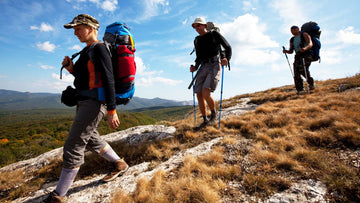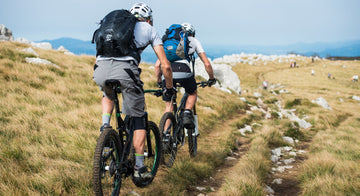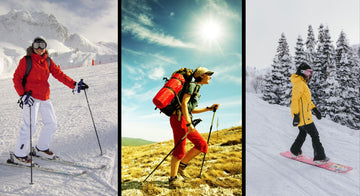Ushood's Guide: The 10 Must-Have Hiking Essentials
by Divya Krishnamoorthy on Oct 23, 2023

Hiking is an exciting outdoor exercise that lets you connect with nature and see stunning scenery. No matter how much hiking experience or if this is your first time, it's essential to be well-prepared and have all the gear you need for a safe and enjoyable walk. This guide will cover the ten most critical things every walker should have. These will ensure you are ready for anything that might happen on the trails.
Why Hiking Essentials Are Important
People love hiking because it lets them enjoy nature, but remember that nature can be random. Even the most experienced hikers can find themselves facing unexpected challenges and situations. That's why carrying the ten essential items recommended by experts in the field is crucial. These items will not only help you navigate the trails and stay safe but also provide peace of mind, knowing that you are prepared for any potential hazards or emergencies that may arise.
The 10 Must-Have Hiking Essentials
Navigation
Navigation is a fundamental skill for any hiker. Even hiking on well-marked trails, carrying a map and compass as a backup is wise in case you lose your way or encounter unexpected detours. Many GPS apps are available today that you can download to your phone. Bring a small power bank to charge your phone on the trail.

Illumination
One of the most common mistakes hikers must make is underestimating the time it takes to complete a hike. Hiking after dark can be dangerous and disorienting, so carrying a reliable headlamp or flashlight is crucial. These light sources will not only help you find your way but also allow you to signal for help in an emergency. Remember to pack extra batteries or opt for a rechargeable headlamp to ensure you're not left in the dark.
Nutrition and Hydration
Staying healthy and full of energy on the hills requires eating right and drinking enough water. Always carry enough water to keep yourself hydrated throughout your hike. Generally, aim for at least two liters of water per person for a full day's hike. Pack extra food, such as energy bars or trail mix, to provide sustenance if your hike takes longer than expected or you encounter unforeseen circumstances.
Insulation
Weather conditions can change rapidly on the trails, so it's crucial to be prepared for temperature fluctuations. Dressing in layers is the key to regulating your body temperature and staying comfortable throughout your hike. A base layer made of moisture-wicking material, such as a UV sun shirt, is an excellent choice for keeping you cool and protected from the sun's harmful rays. Pack a lightweight jacket or sweater to provide insulation in colder conditions.

First Aid Kit
Even on the best-kept paths, accidents and injuries can happen. It is essential to always have a well-stocked first aid kit on hand for healing minor injuries like cuts, scrapes, and blisters. Your first aid bag should include sticky bandages, gauze pads, antiseptic wipes, painkillers, and any other medicines you need. Check your first aid kit often to make sure it has all the tools you need and that they are all up to date.
Emergency Shelter
In case of an unexpected overnight stay on the trails, having an emergency shelter is crucial for staying protected from the elements. A lightweight and compact emergency blanket or bivy sack can provide insulation and protection from wind, rain, and cold temperatures. A large garbage bag can also serve as a makeshift shelter or rain poncho in a pinch.
Fire Starter
In an emergency, being able to start a fire could save your life. For keeping warm, cooking food, and calling for help, you need an easy and reliable way to start a fire, like waterproof matches or a lighter. Additionally, consider packing fire-starting aids like cotton balls soaked in petroleum jelly or commercially available fire starters for convenience.

Sun Protection
Wearing a UV sun shirt, wide-brimmed hat, and sunglasses with UV protection can help shield your body from excessive sun exposure. Sunscreen with a high SPF rating should also be applied to any exposed skin, including your face, neck, and hands. Remember to reapply sunscreen regularly, especially if you're sweating or spending an extended time in direct sunlight.
Knife
A versatile and reliable knife is an essential tool for hikers. It can be used for various tasks, such as cutting rope, preparing food, or assisting in first aid situations. Choose a lightweight, compact knife with a sturdy blade that can withstand outdoor conditions. Additionally, consider carrying other repair supplies like Gear Aid Tenacious Tape and zip ties for fixing broken gear or making temporary repairs.
Communication
Having reliable communication is vital for your safety on the trails. While cell phone coverage can be limited in remote areas, carrying a satellite messenger device, such as the Garmin in Reach Mini, can provide a lifeline in emergencies. These devices allow you to send messages, share your location, and even call for help when traditional cell service is unavailable.
Choosing the Right Gear
The right gear is crucial for ensuring a comfortable and safe hiking experience. Here are some key considerations when choosing your hiking essentials.

Selecting Sturdy Footwear
Investing in a pair of sturdy and comfortable hiking boots or shoes is essential for supporting and protecting your feet. Look for footwear with good traction, ankle support, and waterproof capabilities to handle various trail conditions.
Packing the Perfect Backpack
Choosing the right backpack is essential for carrying all your hiking essentials comfortably. Opt for a backpack with a capacity suitable for the length of your hike, with adjustable straps and padding for a customized fit. Look for features like multiple compartments and external attachment points for easy organization and accessibility.
Dressing in Layers
Layering your clothing is crucial for adapting to changing weather conditions on the trails. Use a UV sun shirt or other moisture-wicking base layer to stay calm and dry. To keep warm, layer on a lightweight fleece or down jacket, then cap off your ensemble with a windproof and water-resistant outer shell.
Protecting Your Eyes and Head
Sunglasses that block ultraviolet light are necessary for protecting your eyes from the sun's glare and prolonging their life. If you want to see more clearly, wear polarized sunglasses or glasses. Put on a broad-brimmed hat or a baseball cap to further shield your face and head from the sun.

Additional Tips for Hiking Safety
Having the proper equipment is essential, but there are other measures you can take to guarantee your safety on a hike. Important things to remember include:
Researching Your Trail
Before heading out on a hike, thoroughly research your chosen trail. Get acquainted with the course, the weather, and any obstacles you could face. Check for recent trail updates or closures, and be aware of any permit requirements or regulations.
Sharing Your Itinerary
Only trekking with telling someone your route and when you expect to return. If you don't attend your planned check-in, have a friend or family member call the police. Itinerary sharing can be made simple using online trip-planning tools or mobile apps.
Checking the Weather
Always check the local forecast before setting out on a hike. Be aware of any potential storms, extreme temperatures, or other adverse weather conditions that could affect your safety. Consider rescheduling your hike if severe weather is expected, or adjust your plans accordingly.
Hiking with a Buddy
Whenever possible, hike with a buddy or in a group. Having a hiking companion can provide an extra level of safety and support in case of emergencies. If you choose to hike alone, take extra precautions and be prepared for self-rescue situations.
Leaving No Trace
Conserve natural resources and engage in Observe leave-no-trace hiking ethics. Minimize your impact on the trails by staying on designated paths, packing out all your trash, and avoiding any disturbance to wildlife or natural habitats. By leaving no trace, you help preserve the beauty of nature for future generations.




